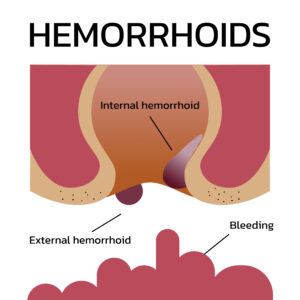If you want to eliminate internal hemorrhoids without surgery, you need to explore Hemorrhoidal Artery Embolization (HAE), an exciting new treatment option. But why do hemorrhoids form, what symptoms do they cause, and how can you find relief? Keep reading to find out!

What are Hemorrhoids?
Hemorrhoids are bulges that form due to abnormal connections between the arteries and veins in your rectum. In the past, you needed surgery to eliminate internal hemorrhoids. But, today, you can choose embolization, which relieves your symptoms by blocking blood flow to abnormal connections between vessels.
Why Choose HAE to Eliminate Internal Hemorrhoids?
Today, HAE is a popular alternative to hemorrhoid surgery. Already, thousands of people have found relief from this effective, minimally invasive treatment options. Consider its advantages:
- Comfort: Treatment is delivered through a tiny puncture on your inner thigh
- Convenience: Patients are able to walk out of the procedure and go home on the same day
- Effective relief: Studies prove that HAE significantly improves the symptoms of internal hemorrhoids, delivering results that are comparable to surgery, but with lower risk for side effects or complications
Who is a Candidate?
HAE may be the best way to eliminate internal hemorrhoids if you:
- Have stage two or three internal hemorrhoids
- Experience heavy bleeding or other intrusive symptoms
- Have a prolapsed hemorrhoid
Meet the Expert at Eliminating Internal Hemorrhoids
Dr. Kevin T. Lie is a double board-certified vascular and interventional radiologist; he specializes in HAE, and has more than two decades of experience in the field.
As the lead Vascular and Interventional Radiologist at our Georgia Hemorrhoid Institute, Dr. Lie brings his knowledge and expertise to elevate your patient experience and deliver optimal results. Ready to see if HAE is the right treatment to relieve your internal hemorrhoid symptoms?
Click here to request an appointment today.
Are you choosing between hemorrhoid embolization and hemorrhoidectomy? Remember, though both are treatment options for hemorrhoids, they are very different procedures in terms of invasiveness, complication risk and recovery period. Yet, despite their differences, both procedures offer similar success rates when it comes to hemorrhoid relief! So, how can you choose the right treatment? Keep reading to learn more.

Hemorrhoids by the Numbers
Symptomatic hemorrhoids are enlarged veins that form in your rectum and/or in the anus. Your hemorrhoids may be internal (located in the lower rectum, above the anus); external (located around the anus); or thrombosed (either internal or external, but containing a blood clot.)
If you want to find relief from hemorrhoids, you'll need to know the severity of your condition, determined by a grade number, since this classification will help guide your treatment choices.
- Grade 1 hemorrhoids are small, unpalpable and typically not visible. They can still cause bleeding during bowel movements but are unlikely to cause other symptoms.
- Grade 2 hemorrhoids may protrude outside your anus during bowel movements, but typically return inside afterward. Symptoms include pain, discomfort, itching and bleeding.
- Grade 3 hemorrhoids bulge outside the anal canal, only returning inside with physical manipulation. They also cause pain, bleeding, and itching.
- Grade 4 symptomatic hemorrhoids are severely prolapsed and won’t stay inside the anal canal even when manually repositioned. Symptoms are also severe.
Understanding hemorrhoid embolization
Hemorrhoid embolization, also called hemorrhoid artery embolization (HAE) is a non-surgical hemorrhoid treatment. This minimally invasive procedure comes with a high success rate, reduced discomfort, a faster recovery period and a reduced risk for complications.
HAE is a great treatment option for patients with grade 2-3 internal hemorrhoids who have significant discomfort. The procedure is performed after inserting a small catheter into the arteries that deliver blood to your hemorrhoids. Next, our Georgia hemorrhoid specialists inject material that blocks the arteries and cuts off blood flow to the hemorrhoids. Without that blood flow, the hemorrhoids shrink until they disappear.
Hemorrhoidectomy: what's involved?
During a hemorrhoidectomy, surgeons physically excise your hemorrhoids. This procedure is usually reserved for people with grade 3 or 4 hemorrhoids and severe symptoms, since the surgery has a high risk for complications that include bleeding, urine retention, urinary tract infections, fecal impaction or fecal incontinence.
Hemorrhoid embolization vs hemorrhoidectomy success rates
Hemorrhoidectomy has a 95% success rate at treating severe hemorrhoids. But the procedure also often causes serious complications and requires an extensive recovery procedure.
In contrast, HAE effectively treats hemorrhoids, with clinical studies consistently demonstrating its high success rate for treating internal grade 2-3 hemorrhoids, effectively reducing bleeding, itching, and discomfort while significantly improving your overall quality of life.
Even better? Compared to hemorrhoidectomy, HAE has a lower complication risk. It’s also commonly performed on an outpatient basis, allowing you to avoid an overnight hospital stay. And, because it’s a minimally invasive discomfort, HAE also minimizes your discomfort and recovery period. Finally, HAE is a more affordable treatment option, since it allows you to avoid long hospital stays.
So, if you have a choice between hemorrhoid embolization vs hemorrhoidectomy, which one should you choose? Well, if you have grade 2 or 3 hemorrhoids, here’s your answer: the relief they provide is likely to be the same, but the cost, pain and risk for complications is much lower for HAE than for hemorrhoidectomy.
Ready to find out if you’re a candidate for HAE in Georgia? Click here to request an appointment

If you want to get rid of internal hemorrhoids, it’s important to understand why you develop this condition, plus how we can prevent or treat it. Let’s explore together.
What are internal hemorrhoids?
Lying inside the rectum, these swollen vessels aren’t visible, and you can’t usually feel them, but they can lead to symptoms including:
Bleeding with bowel movements. While painless, you may notice a bit of blood, usually bright red in color, on your toilet paper or in the toilet bowl.
A prolapsed hemorrhoid, meaning the swollen vessels has pushed through the opening of your anus, leading to irritation and pain.
What are the causes?
The veins surrounding your anus may stretch and swell or bulge when they face pressure. And that pressure could come from:
Straining to pass a bowel movement.
Extended periods of sitting, particularly when sitting on the toilet.
Chronic constipation or diarrhea.
Obesity.
Pregnancy
Anal intercourse.
Following a diet that’s low in fiber.
Lifting heavy items with frequency.
Preventing internal hemorrhoids
The best way to get rid of internal hemorrhoids is to prevent them from forming. And the best way to do that is to make sure your bowel movements pass easily. To that end, you can eat high-fiber foods including whole-grains, fruits and veggies. Aim to drink between six and eight glasses of liquid each day (water is best) and, if diet alone isn’t helping you pass stool, consider adding fiber supplements to the mix.
Then, when you feel the need to pass your bowels, avoid straining or pushing with effort. Also, make sure to engage in regular exercise, since regular movement can help you maintain and stay at your optimal weight, while also encouraging additional fluid intake.
How Can I Get Rid of Internal Hemorrhoids? Choose HAE in Georgia
When diet and lifestyle measures fail to prevent internal hemorrhoids, and you’re not ready, willing or able to undergo surgical treatment, hemorrhoid artery embolization is a great way to get rid of your problem! Ideal for patients with grade 1 to 3 internal hemorrhoids, this minimally invasive treatment option is performed as an out-patient procedure without general anaesthesia or an overnight hospital stay.

If you've been searching for internal hemorrhoid treatment, we invite you to explore Hemorrhoidal Artery Embolization (HAE). This safe, clinically proven treatment option offers an effective and minimally invasive way for you to get rid of hemorrhoids.
Remember, hemorrhoids are enlarged vessels that develop due to abnormal connections between the veins and arteries in your rectum. As such, we can block blood flow to these vessels with embolization, shrinking your hemorrhoids and resolving unpleasant symptoms such as bleeding.
Why Should You Consider HAE for Internal Hemorrhoid Treatment?
Today, more patients are seeking hemorrhoidal artery embolization (HAE) because it provides an alternative to surgery for relieving the discomfort of internal hemorrhoids. Additional advantages of HAE include:
Comfort
We can perform HAE by inserting a catheter through a pin-size access point on your leg. As such, you won't need general anesthesia or an overnight hospital stay. And you'll be able to walk out of your procedure and head home on that same day!
Success rate of HAE is high
Research reveals that patients find comparable symptom relief when choosing HAE or surgery for internal hemorrhoid treatment, yet HAE comes with reduced risk for complications, meaning it's a...
Safer internal hemorrhoid treatment
Unlike procedures such as a hemorrhoidectomy, rubber band ligation or infrared coagulation, HAE does not result in any reported side effects .
When Should You Come to the Georgia Hemorrhoid Institute?
Good candidates for HAE have:
An internal hemorrhoid diagnosis
Disruptive symptoms such as heavy bleeding
Prolapsed internal hemorrhoids
Meet our Interventional Radiologist, Specializing in Internal Hemorrhoid Treatment
At the Georgia Hemorrhoid Institute, Dr. Kevin T. Lie (a dual board-certified vascular and interventional radiologist) specializes in hemorrhoid artery embolization. With more than two decades of experience in this field, he welcomes patients seeking effective internal hemorrhoid treatment.
Under Dr Lie's expert care, the Georgia Hemorrhoid Institute offers effective hemorrhoid treatment solutions. Our hemorrhoid artery embolization procedure yields exceptional patient outcomes across age groups and diverse patient populations. Click here to request an appointment or contact our helpful representatives today at 678-915-2000 for help determining if HAE is the right treatment option for your needs.

Have you heard about hemorrhoid embolization? This is one of the newest, an dleadt invasive, ways to treat internal hemorrhoids. But what are internal hemorrhoids, who do they affect, and why is HE such an effective treatment? Keep reading to find out!
Why do you get internal hemorrhoids?
Internal hemorrhoids are swollen blood vessels that form inside the rectum. Typically, they're the result of pressure due to constipation or straining to pass bowel movements. Symptoms of internal hemorrhoids include bleeding when you pass stool along with itching and mild discomfort.
We classify these hemorrhoids based on the severity of symptoms, using a scale that runs between grades 1 and 4. While discomfort may not be your first symptom, you're quite likely to learn you have internal hemorrhoids after noticing blood spots on your toilet paper or in your toilet bowl.
Treating hemorrhoids: what are the options?
If you have Grade 1 (or mild) hemorrhoids, simple changes, like increasing your water and fiber intake can usually offer relief. However, if you have grade 2, 3 or 4 hemorrhoids, you will likely need to seek medical interventions. Previously, your best option would have been surgical treatment. However, as of 10 years ago, there's a new treatment option in town: hemorrhoid embolization. And, according to research, this minimally invasive treatment option provides equal or better results than surgical removal of hemorrhoids. Plus, the recovery period is shorter and easier, and there's a lower likelihood of complications.
Understanding hemorrhoid embolization
Internal hemorrhoids involve your Corpus Cavernosum Recti (CCR) network of veins and arteries. For that reason, if we reduce CCR blood flow with embolization, we can also reduce the pain, pressure, itching and bleeding associated with internal hemorrhoids.
What should you expect during your embolization? First, our interventional radiologists insert a small catheter through your wrist or groin. Using this tiny access point, we then guide that catheter to blood vessels in the rectum with the help of X-ray imaging. Once in place, we can then implant small coils in those blood vessels, reducing the flow of blood and your symptoms of internal hemorrhoids. Just about 45 minutes later, you'll be ready to go, returning to work the next day and avoiding an overnight hospital stay.
Hemorrhoid embolization success rates
While hemorrhoid embolization only developed 10 years ago, results regarding its efficacy are promising. One 2016 study followed 40 French patients with grade 1 to 3 internal hemorrhoids; one month after their embolizations, none had experienced post-procedural complications, and 94% of participants achieved relief.
By 2018, a more recent study followed checked in with 25 grade 2 and 3 internal hemorrhoid patients, one year after they had hemorrhoid embolizations. Again, none of the patients experienced post-procedural complications. And 78% of them were still symptom-free and enjoying lasting relief from hemorrhoids.
Hemorrhoid Embolization in Georgia
While hemorrhoid embolization is safe and effective, it's only recommended for patients with grade 2 or 3 internal hemorrhoids. Before coming to our Georgia Hemorrhoid institute, try lifestyle changes to see if they can provide relief. Then, if you still experience the pain, itching and bleeding of internal hemorrhoids, come and schedule a consult with our interventional radiologists!






